Vitamin D and Cortisol: Supporting Immune Balance
Introduction
When you think of vitamin D, you probably imagine strong bones, sunshine, and maybe a supplement bottle on your kitchen shelf. But what many don’t realize is that vitamin D also plays a key role in regulating cortisol — the body’s primary stress hormone — and in maintaining the delicate balance between the immune system and the stress response.
Chronic stress and low vitamin D often go hand in hand. One drains your reserves; the other fails to calm the inflammation it leaves behind. Together, they can create a cycle of fatigue, immune vulnerability, and emotional instability.
Let’s explore how vitamin D supports cortisol balance, immune strength, and emotional resilience — and how you can use it to restore a deeper sense of inner equilibrium. 🌸
Looking for supplements for This? Click here.
🌞 The Dual Nature of Cortisol
Cortisol is one of the most misunderstood hormones. In healthy amounts, it’s essential for survival. It:
Regulates blood sugar
Maintains blood pressure
Reduces inflammation when appropriate
Supports alertness and focus
But when cortisol is elevated for too long — from emotional stress, sleep deprivation, or chronic inflammation — it becomes a silent saboteur.
High cortisol suppresses immune function, disrupts hormones, weakens muscles, and even impairs mood. Over time, the brain’s feedback system begins to falter, making cortisol control even harder.
That’s where vitamin D steps in as a powerful hormonal stabilizer. 🌿
🌿 Vitamin D: The Sunshine Hormone

Though commonly called a “vitamin,” vitamin D is actually a prohormone — a precursor to hormones that affect nearly every system in the body.
When your skin absorbs sunlight, UVB rays trigger vitamin D synthesis. It’s then converted by your liver and kidneys into calcitriol, the active hormone that interacts with receptors in over 30 different tissues — including the adrenal glands, where cortisol is produced.
This connection between vitamin D and the adrenal system is what makes it so crucial for balancing stress and immune health. 🌞
🌙 How Vitamin D and Cortisol Interact
Regulating the HPA Axis
Your HPA axis (hypothalamic-pituitary-adrenal system) manages your body’s response to stress. Vitamin D receptors are found throughout this axis, especially in the hypothalamus and adrenal cortex.
Adequate vitamin D helps the HPA axis stay sensitive to feedback signals, meaning your brain knows when to stop producing cortisol. When vitamin D is low, this system can become desensitized, leading to persistently high cortisol levels.
Reducing Inflammation That Drives Stress Hormones
Inflammation doesn’t just cause physical symptoms — it triggers stress hormones. Cytokines released by chronic inflammation stimulate the HPA axis and raise cortisol.
Vitamin D helps suppress excessive cytokine production while increasing anti-inflammatory markers like IL-10. This reduces both physical and psychological stress.
Improving Mood and Sleep
Low vitamin D is linked to increased anxiety, depression, and insomnia — all of which elevate cortisol. By supporting serotonin synthesis and melatonin regulation, vitamin D promotes calmer moods and deeper rest. 🌙
🌸 The Immune–Cortisol Connection
The immune system and cortisol have an intricate dance.
When you’re sick, inflammation activates cortisol to prevent the immune response from going overboard.
But if cortisol remains too high, it can suppress immunity entirely, making you more vulnerable to infections.
Vitamin D helps fine-tune this balance by:
Strengthening immune defenses (especially T-cells and macrophages)
Preventing excessive inflammatory response
Enhancing cortisol’s beneficial, not harmful, effects
In essence, vitamin D helps your immune system stay alert without being overreactive — the sweet spot of resilience. 🌿
🌞 Signs of Vitamin D Deficiency and Cortisol Imbalance
Because both vitamin D and cortisol affect so many systems, deficiency symptoms often overlap:
Constant fatigue, even after rest
Brain fog and poor memory
Low motivation or mild depression
Increased anxiety or irritability
Frequent colds or infections
Muscle weakness or slow recovery
Weight gain, especially around the abdomen
Sleep disturbances (waking up at 2–3 a.m.)
If these symptoms sound familiar, there’s a good chance both your vitamin D and cortisol rhythms are off balance. 🌙
🌸 The Science: What Research Shows
People with low vitamin D levels tend to have higher baseline cortisol and weaker HPA-axis regulation.
Supplementation with vitamin D (2000–4000 IU daily) has been shown to reduce cortisol output and lower perceived stress.
Vitamin D deficiency is associated with higher inflammatory cytokines, more fatigue, and greater risk of mood disorders.
Optimal vitamin D status enhances immune tolerance, meaning the immune system responds efficiently but not excessively — crucial during times of chronic stress.
These findings suggest that vitamin D doesn’t just support the immune system; it’s a hormonal buffer that helps recalibrate the entire stress response. 🌿
🌞 How Vitamin D Supports Emotional and Cognitive Stability
Vitamin D receptors are abundant in areas of the brain that regulate emotion and cognition, including the hippocampus, amygdala, and prefrontal cortex.
When vitamin D is low, serotonin production drops and inflammation rises in these regions, contributing to low mood and anxiety.
By contrast, adequate vitamin D supports:
Serotonin synthesis: improving mood and resilience
Dopamine regulation: enhancing focus and motivation
Neuroprotection: reducing inflammation in brain tissue
Stress tolerance: improving feedback sensitivity in the HPA axis
In short, vitamin D helps your brain stay calm under pressure. 🌸
🌿 Cortisol, Immunity, and Autoimmunity
Chronic stress and low vitamin D are two of the biggest drivers of autoimmune imbalance — when the immune system mistakenly attacks your own tissues.
Here’s why:
Prolonged cortisol elevation suppresses immunity at first, but over time, the immune system rebounds in a hyperactive state.
Low vitamin D fails to regulate T-cells and immune signaling, allowing excessive inflammation.
Restoring vitamin D can help stabilize immune activity, reduce flare-ups, and support overall cortisol balance in autoimmune conditions such as multiple sclerosis, lupus, and rheumatoid arthritis. 🌿
Looking for supplements for This? Click here.
🌞 Vitamin D and Seasonal Cortisol Fluctuations
Many people experience higher stress, fatigue, and inflammation in the winter months. That’s partly due to less sunlight — and consequently, lower vitamin D.
Studies show that cortisol levels tend to rise in the winter, while vitamin D levels drop, suggesting an inverse relationship.
Getting daily sunlight or supplementing during darker seasons can prevent this hormonal drift — keeping energy steady and immune resilience strong. 🌸
🌸 Optimal Vitamin D Levels for Cortisol and Immune Health
The ideal blood level of 25-hydroxyvitamin D for overall wellness is often cited between 40–60 ng/mL.
Below 30 ng/mL is considered deficient, and below 20 ng/mL is severely deficient.
To achieve optimal balance:
Moderate sunlight: 10–20 minutes of midday exposure on skin (arms, legs, face).
Diet: Include fatty fish (salmon, sardines), fortified foods, egg yolks, and mushrooms.
Supplementation: 2000–4000 IU daily for most adults, depending on sun exposure and body weight.
Always test your blood levels after 2–3 months of supplementation to avoid excess, as vitamin D is fat-soluble. 🌞
🌿 The Synergy Between Vitamin D and Other Nutrients
Magnesium
Magnesium is required to activate vitamin D. Without it, supplementation may not raise your levels effectively. It also directly lowers cortisol and improves sleep.
Vitamin K2
Balances calcium metabolism, ensuring vitamin D’s benefits reach bones and arteries safely.
Omega-3 Fatty Acids
Work synergistically with vitamin D to reduce inflammation and support immune balance.
Zinc and Selenium
Both are involved in hormone and immune regulation, and deficiencies can worsen stress reactivity. 🌿
🌸 Vitamin D, Cortisol, and Sleep Quality
Healthy cortisol levels peak in the morning and taper off at night. Low vitamin D disrupts this pattern, leading to higher nighttime cortisol — one of the most common causes of insomnia and early waking.
Supplementing with vitamin D can help:
Regulate melatonin production
Improve slow-wave sleep quality
Reduce nighttime cortisol spikes
When your body’s light-dark rhythm is restored, both stress resilience and immune health improve dramatically. 🌙
🌞 Stress, Immunity, and Inflammation: The Healing Triangle

Chronic stress, vitamin D deficiency, and inflammation form a vicious triangle. Each one feeds the others.
Breaking that cycle starts with repletion:
Vitamin D lowers inflammation.
Reduced inflammation decreases cortisol demand.
Lower cortisol allows better immune balance.
Over time, this creates a self-reinforcing loop of recovery. 🌿
🌿 Who Benefits Most From Vitamin D Supplementation
People living in northern latitudes or with limited sunlight
Individuals with darker skin (which produces less vitamin D from sun exposure)
People who work indoors or wear sunscreen constantly
Those with autoimmune or chronic inflammatory conditions
Individuals with anxiety, depression, or fatigue
Anyone under persistent stress or burnout
If this sounds like you, optimizing vitamin D can be a simple yet powerful way to reclaim balance. 🌞
🌸 When to Take Vitamin D
Vitamin D is fat-soluble, so it’s best taken with meals containing healthy fats (olive oil, avocado, nuts).
You can take it in the morning or midday — taking it late at night may interfere slightly with melatonin for some people.
If combined with magnesium and omega-3s, morning dosing is ideal to support daytime focus and calm energy. 🌿
🌞 The Emotional Benefits of Vitamin D
People often describe the effect of vitamin D not just as physical but emotional.
When levels normalize, there’s a sense of steadiness — fewer mood swings, less anxiety, and greater emotional range.
It’s not a “happiness pill,” but it provides the biochemical foundation for emotional resilience.
When your hormones, immune system, and brain all feel supported, you begin to experience what true balance feels like — calm energy, not fatigue; steady focus, not tension. 🌸
🌙 Pairing Vitamin D With Lifestyle Practices
To amplify vitamin D’s benefits for cortisol and immune balance:
Get morning sunlight daily to reset circadian rhythm.
Practice deep breathing to lower cortisol naturally.
Prioritize sleep — vitamin D improves it, but rest multiplies the effect.
Eat anti-inflammatory foods: fish, greens, berries, nuts, olive oil.
Limit sugar and alcohol, both of which deplete vitamin D and raise cortisol.
Exercise moderately — yoga, walking, resistance training — to build physical and emotional strength. 🌿
🌞 Realistic Timeline for Results
1–2 weeks: Improved mood and energy.
3–4 weeks: Better sleep and stress tolerance.
6–8 weeks: Noticeable immune strength and mental clarity.
3 months+: Stabilized cortisol rhythm, fewer fatigue crashes, and deeper emotional calm.
This isn’t a quick fix — it’s a physiological restoration process. 🌸
🌿 The Takeaway
Cortisol and vitamin D are two sides of the same coin — one mobilizes energy, the other stabilizes balance.
When stress is chronic, cortisol drains your body. When vitamin D is restored, it rebuilds.
By supporting your HPA axis, calming inflammation, and strengthening immune defenses, vitamin D becomes one of the most elegant ways to help your body remember how to rest, repair, and thrive.
The next time sunlight touches your skin, think of it as more than warmth — think of it as balance returning to your system. 🌞✨
Looking for online therapy ? Click Here.
📚 References
Holick MF. “Vitamin D Deficiency.” New England Journal of Medicine, 2007.
Zittermann A et al. “Vitamin D and the Immune System.” Anticancer Research, 2015.
Bergman P et al. “Vitamin D and Cortisol: Regulation of Stress and Immune Response.” Nutrients, 2022.
Sassi F et al. “Vitamin D: Nutrient, Hormone, and Immunomodulator.” Frontiers in Immunology, 2018.
Al-Daghri NM et al. “Inverse Association Between Vitamin D and Cortisol Levels.” Clinical Endocrinology, 2019.
Schmidt W et al. “Effects of Vitamin D on HPA Axis Regulation and Sleep.” Psychoneuroendocrinology, 2020.
Grant WB & Boucher BJ. “Vitamin D and Inflammation.” Nutrients, 2019.
Kalueff AV et al. “Neurosteroid Vitamin D and Behavior: From Brain Development to Stress Response.” Trends in Endocrinology and Metabolism, 2004.
Mellenthin L et al. “Association of Low Vitamin D Levels With Depression and Anxiety.” Psychosomatic Medicine, 2015.
Cannell JJ et al. “Vitamin D and Immune Health: Beyond Bone.” Journal of Steroid Biochemistry and Molecular Biology, 2020.
Related Posts
-
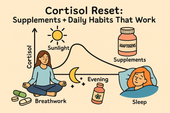
Cortisol Reset: Supplements + Daily Habits That Work
-
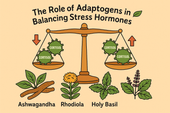
The Role of Adaptogens in Balancing Stress Hormones
Adaptogens work at the root of stress — your nervous system. 🌿 Learn how these powerful herbs help regulate cortisol, calm your nerves, and restore balance between energy and relaxation. ✨
-
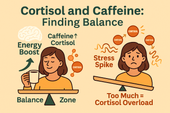
Cortisol and Caffeine: How Much Is Too Much?
Caffeine can boost energy and focus — but too much can overstimulate your stress hormones. ☕ Learn how caffeine affects cortisol, energy levels, and mood, and discover how to find the perfect balance for lasting calm and clarity. 🌿
-
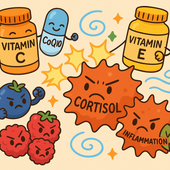
Antioxidants for Stress Management and Cortisol Control
When stress overwhelms your body, antioxidants come to the rescue. 🌿 Learn how vitamin C, CoQ10, and other natural compounds help reduce oxidative stress, regulate cortisol, and restore calm energy from within. ✨
-
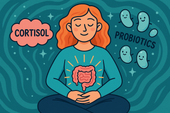
Cortisol and Gut Health: How Probiotics May Help
Chronic stress doesn’t just affect your mind — it changes your gut. 🌿 Learn how cortisol disrupts the microbiome and how probiotics can help restore balance, improve digestion, and calm your stress response naturally. ✨
-
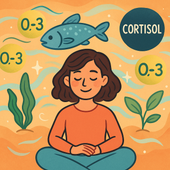
Omega-3s and Cortisol: Fighting Inflammation Naturally
Omega-3s are more than heart-healthy fats — they’re natural cortisol regulators. 🌿 Learn how EPA and DHA help reduce chronic inflammation, calm the nervous system, and support stress recovery from the inside out. ✨
-
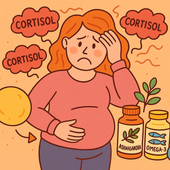
High Cortisol and Belly Fat: Can Supplements Help?
Chronic stress can make belly fat harder to lose — but supplements like ashwagandha, magnesium, and omega-3s may help restore cortisol balance. 🌿 Learn how science-backed nutrients support fat metabolism, calm your stress response, and bring your body back into harmony. ✨
-
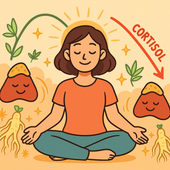
How Ginseng Can Support Energy and Cortisol Balance
Ginseng is one of nature’s most powerful adaptogens, helping your body handle stress without burning out. 🌿 Learn how this ancient root supports balanced cortisol, steady energy, and sharper focus — restoring vitality naturally and sustainably. ✨
-
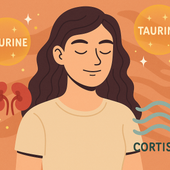
Taurine and Cortisol: Supporting Focus Under Stress
When cortisol surges, focus fades — but taurine helps restore balance. 🌿 Learn how this powerful amino acid calms your nervous system, regulates stress hormones, and sharpens concentration without jitters or fatigue. ✨
-
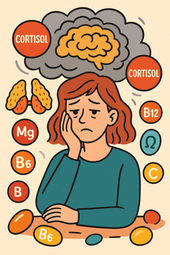
The Link Between Cortisol, Brain Fog, and Nutrient Deficiencies
When brain fog sets in, it’s not just in your head — it’s in your hormones. 🌿 Discover how cortisol imbalance and nutrient deficiencies like low magnesium, B vitamins, and omega-3s can cloud your focus and how restoring balance brings back mental clarity and calm. ✨
-
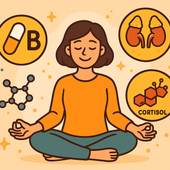
B Vitamins for Stress, Energy, and Cortisol Regulation
B vitamins are the foundation of stress resilience and steady energy. 🌿 Learn how this essential group of nutrients helps regulate cortisol, restore focus, and keep your nervous system calm — giving you balance from the inside out. ✨
-

Cortisol Imbalance and Chronic Fatigue: Can Supplements Help?
When chronic stress keeps cortisol high, fatigue and brain fog follow. 🌿 Learn how to rebalance your stress hormones naturally with calming nutrients, adaptogens, and lifestyle rituals that restore energy, focus, and inner peace. ✨
-

Adaptogen Stacks for Better Sleep and Lower Stress Hormones
Adaptogens can help your body recover from stress and sleep better by regulating key hormones like cortisol and adrenaline. 🌿 Learn how adaptogen stacks work to restore balance, calm the mind, and rebuild resilience — so you can rest deeply and wake renewed. ✨
-

Phosphatidylserine for Nighttime Cortisol Control
When stress hormones stay high at night, deep rest becomes impossible. 🌙 Discover how phosphatidylserine helps calm the brain, reduce nighttime cortisol, and restore healthy sleep rhythms — so you can wake up peaceful, clear, and recharged. ✨
-

Magnesium for Stress Relief and Cortisol Reduction
Magnesium is one of the most powerful natural tools for stress relief. 🌿 This essential mineral calms your nervous system, lowers cortisol, and helps your body recover from chronic tension. Learn how magnesium replenishes balance, improves sleep, and restores inner peace — naturally. ✨
-

Supplements to Improve Sleep by Balancing Cortisol
When cortisol stays high at night, sleep becomes a struggle. 🌙 Discover natural supplements that calm the nervous system, lower stress hormones, and restore your body’s natural rhythm. From magnesium and ashwagandha to L-theanine and phosphatidylserine, learn how to build deeper, more restorative rest. 🌿
-

Cortisol and Sleep: Why Stress Keeps You Awake
When stress keeps your body in fight-or-flight mode, cortisol refuses to calm down — and sleep becomes impossible. 🌙 Learn how elevated cortisol disrupts your circadian rhythm, suppresses melatonin, and turns restless nights into exhaustion. Discover how to restore balance and reclaim deep rest. ✨
-

L-Theanine for Cortisol Balance and Anxiety Relief
L-Theanine — the calming amino acid from green tea — helps quiet the mind and balance cortisol, the body’s key stress hormone. 🌿 Learn how it promotes calm focus, eases anxiety, and supports deep rest without sedation, backed by modern research and centuries of tradition. ✨
-

Rhodiola Rosea and Stress Resilience: A Natural Cortisol Regulator
Rhodiola rosea is one of nature’s most powerful tools for resilience. 🌿 This Arctic root helps balance cortisol, fight fatigue, and sharpen focus — keeping you calm yet energized even under stress. Discover the science behind Rhodiola’s adaptogenic power and how it helps your body thrive under pressure. ✨
-

Ashwagandha for Cortisol Balance: What the Science Says
Ashwagandha helps your body recover from chronic stress by calming the adrenal system and balancing cortisol — your key stress hormone. 🌿 Learn what science says about this powerful adaptogen, how it restores energy and focus, and why it’s one of nature’s most effective tools for modern stress relief. ✨
-

Supplements That Naturally Lower Cortisol Levels
When cortisol levels calm, your energy transforms — no more crashes or jitters, just steady focus and inner peace. 🌿 Learn which natural supplements and habits lower stress hormones, boost calm energy, and help your body thrive with balance instead of burnout. ✨
-

What Is Cortisol Imbalance? Symptoms You Shouldn’t Ignore
Cortisol — your body’s main stress hormone — keeps you alert and energized, but when it’s out of balance, it can drain your health. 🌿 Learn the signs of cortisol imbalance, from fatigue and anxiety to sleep disruption and stubborn weight gain, and discover how to restore calm, energy, and hormonal harmony naturally. ✨
-

The Best Daily Multivitamins for Menopausal Women
Menopause brings new nutritional needs that your old vitamin routine may no longer meet. 🌿 Discover how the right daily multivitamin can boost energy, balance mood, support bone and heart health, and keep your skin glowing. Learn which nutrients truly matter — from vitamin D to magnesium and B12 — to feel strong and vibrant every day. ✨
-

Antioxidants and Menopause: Fighting Inflammation Naturally
During menopause, oxidative stress and inflammation can quietly accelerate aging, fatigue, and skin changes. 🌿 Learn how antioxidants — from vitamins C and E to polyphenols in berries and green tea — help neutralize free radicals, reduce inflammation, and restore balance naturally. Discover the science of radiant, resilient aging. ✨
-

How CoQ10 Supports Heart Health After Menopause
After menopause, heart health becomes more important than ever. ❤️ Discover how CoQ10 — your body’s natural energy molecule — supports cardiovascular strength, restores vitality, and protects against oxidative stress. Learn how this essential nutrient helps keep your heart energized, balanced, and resilient through every stage of life. 🌿
-

Collagen Supplements for Skin and Joint Health Post-Menopause
After menopause, collagen loss affects both skin elasticity and joint comfort — but supplements can help rebuild from within. 🌸 Learn how collagen peptides, vitamin C, and other nutrients work together to restore firmness, reduce stiffness, and keep you glowing and mobile well into your next chapter. ✨
-

Calcium and Vitamin D: Protecting Bone Health in Menopause
Menopause brings hormonal changes that can weaken bones—but with the right nutrients, strength and stability can be rebuilt. 🦴 Learn how calcium and vitamin D work together to protect bone density, prevent fractures, and keep your body resilient. This guide explores nutrition, sunlight, and lifestyle habits that help your bones stay strong and vibrant for years to come. ☀️💪
-

Adaptogens for Energy and Resilience During Menopause
Feeling drained or emotionally scattered during menopause? 🌿 Discover how adaptogenic herbs like Ashwagandha, Rhodiola, and Ginseng can restore energy, balance cortisol, and build emotional resilience. Learn how these natural allies work with your body—not against it—to help you stay strong, focused, and calm through life’s hormonal changes. 🌸
-

Supplements That Help Beat Menopause Fatigue
Menopause fatigue can feel like more than tiredness—it’s a total energy crash. This guide explores how specific supplements, mindful breathwork, and therapy can help restore balance. Learn how nutrients like B vitamins, magnesium, and adaptogens rebuild your stamina, while breathwork and emotional healing calm your nervous system and bring vitality back to your days. 🌿✨
-

Herbal Blends for Menopausal Restlessness: Finding Calm in Transition
Herbal blends bring the wisdom of nature into moments of rest and renewal. Discover how soothing herbs like chamomile, lemon balm, and ashwagandha work together to calm menopausal restlessness, balance hormones, and invite deep relaxation. 🌿💫
-

Magnesium + Glycine for Deep Sleep During Menopause
Nutrients like magnesium, glycine, and B vitamins form the foundation for deep, restorative sleep during menopause. Discover how these natural compounds calm your nervous system, balance hormones, and help you wake up refreshed and recharged. 🌿💤
-

Melatonin and Menopause: Restoring Your Sleep Cycle
Nutrients are the foundation of hormone balance and energy. Learn how vitamins, minerals, and whole foods like greens, salmon, and berries nourish women’s bodies during menopause and beyond — restoring vitality, mood, and strength. 🌿🥗
-

How L-Theanine Helps With Menopausal Anxiety
Science continually deepens our understanding of the human body, from hormones to neurotransmitters. Discover how evidence-based research shapes modern wellness — bridging natural medicine, neuroscience, and hormone balance for healthier living. 🔬🌿
-

Can Ginkgo Biloba Improve Memory in Menopausal Women?
Hormone therapy can be a powerful tool for easing menopause symptoms and restoring balance. Learn how it works, the types available, and how to combine it safely with lifestyle and natural support for optimal well-being. 🌸💊
-

B Vitamins for Mental Clarity During Menopause
Nutrients are the foundation of mental and physical balance during menopause. Discover how vitamins, minerals, and whole foods like leafy greens, fish, nuts, and citrus can fuel energy, clarity, and calm while supporting hormonal health. 🌿✨
-

Mood Swings and Menopause: Natural Nutrient Support
Probiotics do more than support digestion — they help balance mood, hormones, and immunity too. Learn how a healthy gut microbiome can ease menopause symptoms, boost energy, and improve emotional resilience naturally. 🌿🦠
-

Brain Fog in Menopause: Supplements That May Help
Supplements can be powerful allies in restoring balance, energy, and focus—especially during menopause. Learn how nutrients like omega-3s, vitamin D, magnesium, and herbal adaptogens work together to support brain health, reduce stress, and promote lasting vitality. 🌿💊
-

Adaptogen Stacks for Reducing Night Sweats
Hormone detox isn’t about cleansing your body—it’s about restoring flow. Learn how the liver, gut, and endocrine systems work together to eliminate hormone buildup and how herbs like milk thistle, dandelion, and schisandra support balance, clarity, and natural vitality. 🌿💫
-

Cooling Menopause Symptoms with Herbal Support
Ashwagandha is one of nature’s most powerful adaptogens, helping women manage stress, sleep better, and balance hormones naturally. Discover how this ancient root supports calm energy, emotional resilience, and relief from menopause-related anxiety and fatigue. 🌿💫
-

Evening Primrose Oil and Menopause: What the Research Says
Hot flashes are one of the most common—and frustrating—symptoms of menopause. Discover what causes them, why the body’s “internal thermostat” becomes unbalanced, and the natural supplements and lifestyle shifts that can help you cool down, rest better, and feel more in control. 🔥💧
-

How Black Cohosh Helps with Menopausal Symptoms
Sleep disturbances are among the most exhausting symptoms of menopause—but they don’t have to rule your nights. Discover how natural strategies and calming supplements can help you fall asleep faster, stay asleep longer, and wake up feeling truly restored. 🌙💤
-

Natural Supplements That May Reduce Hot Flashes
Hot flashes can disrupt sleep, confidence, and daily comfort—but natural relief is possible. Discover the best research-backed supplements like black cohosh, red clover, and licorice root that may reduce hot flashes, balance hormones, and restore inner calm during menopause. 🌿💫
-

Omega-3s and Menopause: Supporting Mood and Inflammation
Omega-3 fatty acids are essential for hormonal harmony, brain function, and emotional balance—especially during menopause. Learn how these healthy fats reduce inflammation, support heart health, and restore calm, vitality, and focus through every stage of midlife. 🌊💫
-

The Role of Vitamin D in Menopausal Health
Vitamin D plays a powerful role in menopausal health—supporting bone strength, hormone balance, and mood stability. Discover how optimizing your vitamin D levels can improve sleep, energy, and emotional well-being while protecting long-term vitality through every stage of menopause. 🌞💪
-

Magnesium for Menopause: Relaxation, Sleep, and Hormonal Support
Self-regulation is the art of staying calm, centered, and in control—no matter what life throws your way. Learn how to strengthen emotional balance, manage stress responses, and cultivate inner peace through mindful techniques that reconnect your heart, body, and brain. 🌿💫
-

Can Adaptogens Like Ashwagandha Ease Menopausal Symptoms?
Brain fog during menopause can make even simple tasks feel overwhelming—but you’re not losing your sharpness, your hormones are simply shifting. Discover how adaptogens like ashwagandha and key nutrients can restore mental clarity, balance cortisol, and bring calm focus back to your day. 🌿🧠
-

Supplements That Support Hormonal Balance During Menopause
Herbal supplements have supported women’s health for centuries—and modern science is finally catching up. From ashwagandha and maca to red clover and rhodiola, discover how nature’s most trusted herbs can calm stress, balance hormones, and enhance energy through every life stage. 🌿✨
-

The Ultimate Motivation Stack: Supplements That Work Together
Discover how therapy helps restore motivation, focus, and emotional balance alongside supplement and mindset strategies. This empowering article explores how addressing thought patterns and emotional blocks through therapy can complement biochemical tools for long-term drive and well-being. 🧠💬
-

Entrepreneurial Drive: Can Supplements Help You Avoid Burnout?
Entrepreneurship demands energy, creativity, and mental resilience—but without balance, it leads to burnout. This in-depth article explores how nootropic supplements, adaptogens, and mindset tools can help entrepreneurs sustain motivation, manage stress, and keep their drive sharp for the long haul. 🚀💼

















































